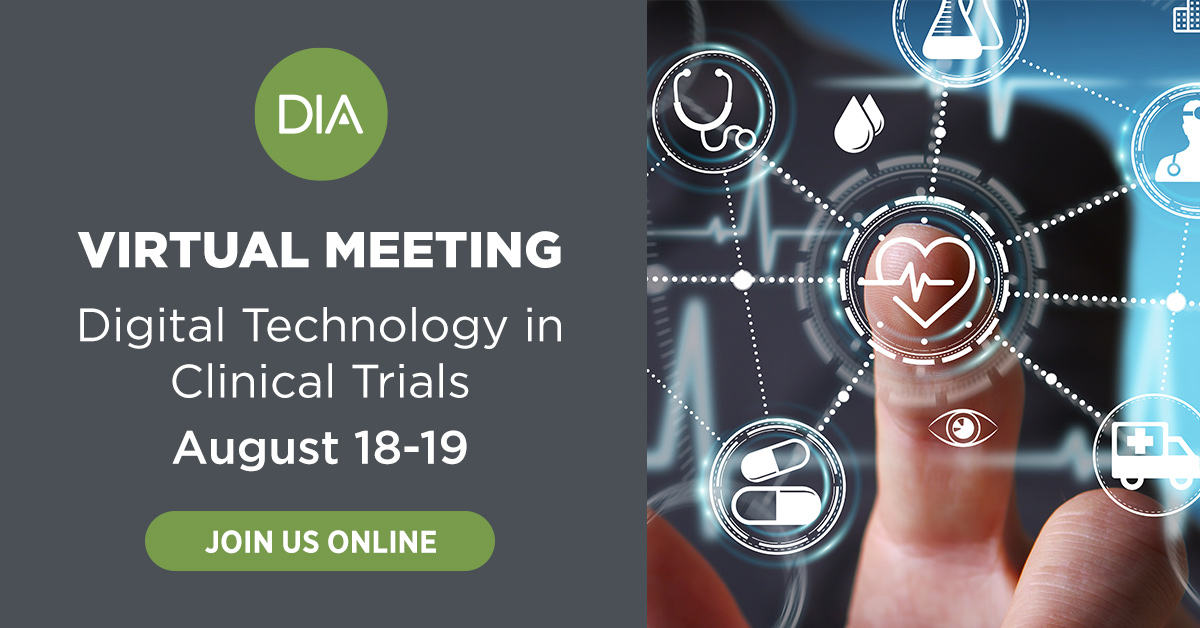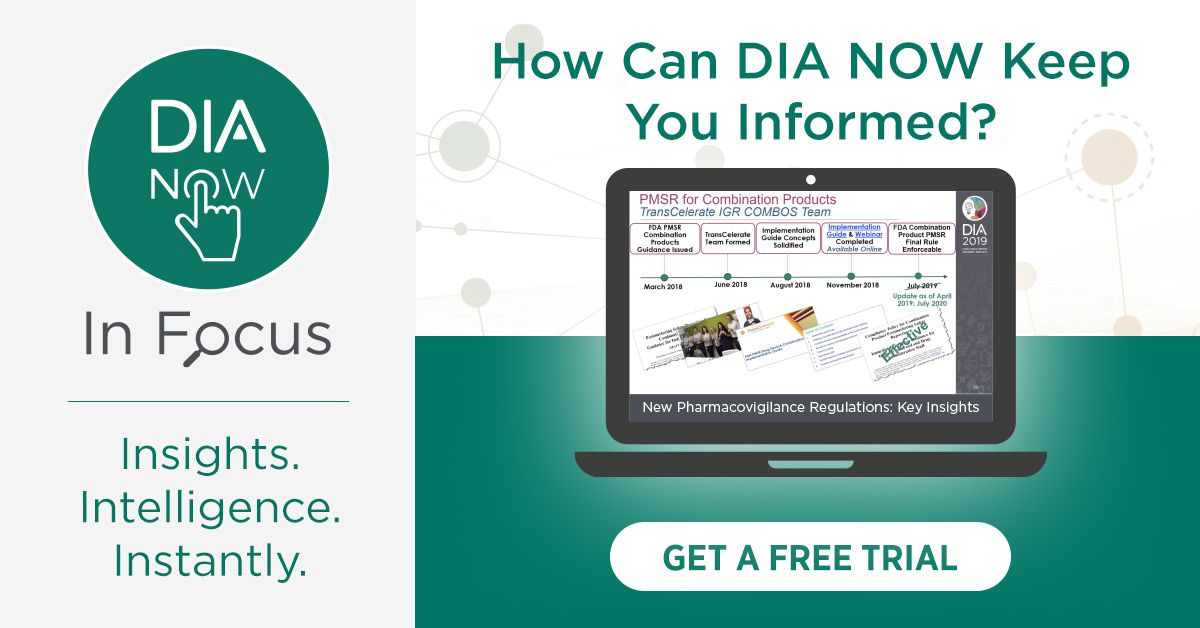Prophetic words. As we live through these unprecedented times, we often see people at their best, working together in harmony, and showing kindness in our neighborhoods and extended communities. These acts practice the same spirit of compassionate community that supports our DIA mission: to foster innovation to improve health and well-being worldwide. Not health and well-being for some, but health and well-being for all persons, in all places.
Sadly, it remains too clear that while we may live in the same communities, the color of one’s skin or gender identity or choice of belief system continues to divide too many cities into very different living experiences. We are deeply saddened by the recent tragedies in the US and the detestable biases they highlight. As a global organization rooted in neutrality and inclusion for over 56 years, DIA strongly condemns all hateful behavior. We stand against all forms of racism, discrimination, oppression, inequality, and injustice.
In literally every part of our world, hundreds of clinical trials – collaborations among scientists, companies, patients, and regulators – are researching vaccines or therapies for COVID-19. Food banks and other volunteer organizations are helping hurting families deal with hunger and other hardships caused by the global economic downturn of this pandemic. Compassion and kindness still exist. Unfortunately, their opposites endure too. The phrase quoted above opens Charles Dickens’ A Tale of Two Cities. It’s long past time to bridge these two cities together into a united, global community for all.
Table of Contents
EXECUTIVE LEADERSHIP
Subscribe
Love Global Forum‘s new online format? Subscribe today and never miss an issue.
Editorial Board
Content stream editors
Gary Kelloff US National Institutes of Health
David Parkinson ESSA Pharma, Inc.
regulatory science
Yoshiaki Uyama Pharmaceuticals and Medical Devices Agency (PMDA)
Adora Ndu BioMarin Pharmaceutical, Inc.
Patient engagement
Deborah Collyar Patient Advocates In Research (PAIR)
Lode Dewulf Servier
VALUE AND ACCESS
Monika Schneider Duke-Margolis Center for Health Policy
Editorial Staff
Alberto Grignolo, Editor-in-Chief Parexel International
Ranjini Prithviraj, Global Associate Director, Content Collaboration DIA Publications
Sandra Blumenrath, Science Writer DIA Publications
Chris M. Slawecki, Senior Digital Copyeditor DIA Publications
Regional Editors
David Mukanga Bill and Melinda Gates Foundation
ASEAN
Silke Vogel Duke-National University of Singapore Medical School
AUSTRALIA/NEW ZEALAND
Richard Day University of New South Wales, Medicine, St. Vincent’s Hospital
CANADA
Judith Glennie JL Glennie Consulting, Inc.
Megan Bettle Health Canada
CHINA
Ling Su Shenyang Pharmaceutical University, Lilly Asia Ventures
Europe
Thomas Kühler Sanofi R&D
INDIA
J. Vijay Venkatraman Oviya MedSafe
JAPAN
Akiko Ikeda Janssen Pharmaceutical K.K.
LATIN AMERICA
Cammilla Gomes Roche
MIDDLE EAST
Inas Chehimi Novartis
USA
Ebony Dashiell-Aje BioMarin
Young Professionals Editor
DIA Membership
Bringing together stakeholders for the betterment of global health care.
Executive Leadership
Q&A with DIA Americas Senior VP and Managing Director and DIA Global Program Officer Robin Weinick

Robin Weinick
Senior Vice President and Managing Director for DIA Americas
n April 2020, Robin Weinick, PhD, was appointed Senior Vice President and Managing Director for DIA Americas, and DIA’s first Global Program Officer. Robin previously served as Vice President, Division for Research on Healthcare Value, Equity, and the Lifespan, at RTI International, a nonprofit research institute dedicated to improving the human condition. She has also served as Associate Director for Health at the RAND Corporation and on the faculty of Harvard Medical School and Massachusetts General Hospital.
How COVID-19 Renews Clinical Trial Vigor for Patients and Their Advocates
Patient Advocates In Research (PAIR)
Nontuberculous Mycobacteria Info and Research (NTMir)
nfortunately, the already complicated lives of existing patients have become more so. While people around the world grapple with new realities from COVID-19, millions of patients with comorbidities, weakened immune systems, or long-term side effects from prior treatments are considered at high risk for infections and complications and continue to deal with daily dilemmas that have no right answer. This “new normal” concept, which now describes how society will function post-COVID-19, is common for many patients: Their “new normal” began the moment they were diagnosed.
- COVID-19 has prompted many modifications to keep clinical trials operating.
- Many of these changes help reduce patient burden and can increase receptivity to clinical trial participation in the future.
- Patient advocates want key clinical trial modifications caused by COVID-19 to become permanent and are ready to help make that happen.
Repurposing Challenges: Conceptualization of a Research Agenda
National Center for Advancing Translational Sciences
National Institutes of Health
@ncats_nih_gov
epurposing,” or finding a new therapeutic use for a drug other than the indication for which it was originally intended or used, is a tantalizingly simple concept. The pleiotropic nature of drug targets dictates that most drugs will have effects on more than one pathway, cell type, organ, or disease. And the evolutionary gene family organization of the human genome means that most drugs will have effects on multiple structurally related targets.
While this pleiotropy and polypharmacology can lead to undesired adverse clinical events, it can also lead to unanticipated clinical benefits for diseases other than the one it was initially intended to treat. The history of medicine—and particularly my own specialty of neuropsychiatry—is replete with examples of drugs developed for one indication being found to be useful for another. And the advent of collections of approved drugs amenable to facile screening against cellular or model organism-based models of human diseases have spawned in the last decade thousands of reported novel activities for drugs already in clinical use. Such drugs often already have an extensive safety profile and thus offer a much more rapid development course, leapfrogging years of optimization, toxicity testing, and chemistry, manufacturing, and controls (CMC).
![]() Podcasts
Podcasts
Data Handling and Reporting for Ongoing Clinical Trials During COVID-19
Algorics
Algorics
he COVID-19 outbreak has significantly impacted the clinical research industry. Analysis conducted on data obtained from www.clinicaltrials.gov on March 31, 2020, identified more than 9,250 industry-funded clinical trials that could be impacted. Regulatory agencies in the EU, US, and elsewhere have published guidance on how clinical trial sponsors could approach these ongoing studies. This article will specifically focus on how to handle data-related challenges from the statistical point of view, taking regulators’ guidance into account.
Ongoing clinical trials face multiple risks due to COVID-19, including:
- Inability of the patient to visit the clinical site
- Lack of adherence to protocol-specific procedures due to movement restrictions
- Travel restrictions impacting resupply of investigational medicinal products to sites and patients
- Additions to hospitals’ existing workload burden to treat the pandemic, which can further delay and reprioritize clinical protocol-related activities.
Around the Globe
n late March 2020, the US Food and Drug Administration (FDA) issued its Guidance on Conduct of Clinical Trials of Medical Products during COVID-19 Public Health Emergency: Guidance for Industry, Investigators, and Institutional Review Boards. “Sponsors in consultation with the investigators and institutional review boards should assess whether the protection of a patient’s safety, welfare, and rights are best served by continuing the study participant in the trial as per the protocol, modify the protocol to minimize risk such as by using telemedicine wherever possible, or by discontinuing the administration or use of the investigational product or even participation in the trial,” explains FDA Deputy Commissioner for Medical and Scientific Affairs Anand Shah in an interview with DIA.
Around the Globe
@dukenus
hat are the best drugs to treat COVID-19 patients? How long do antibodies offer protection against SARS-CoV-2 infections? When will the first vaccine be rolled out for mass immunization?
The Centre of Regulatory Excellence (CoRE), Duke-NUS Medical School organised a webinar with experts from Singapore who are at the forefront of innovations during the COVID-19 pandemic. The scope of the webinar spanned developments in diagnostics, therapeutics, vaccines, and insights on regulatory systems to support their market launch.
Around the Globe
New Modes of Living and Working
OVID-19 has dominated all aspects of life “down under,” capping off a remarkable series of national “trials” in a very short space of time: catastrophic and unprecedented bush fires that started in earnest in November 2019, burned into February 2020 and destroyed communities across the country in the process. Then widespread flooding, again across large swaths of the country. And before we could take a breath, COVID-19 was upon us, and although the rapid achievement of national consensus on preventative policies has “flattened the curve” in Australia, the unprecedented impact of the virus is with us still. We count ourselves lucky in comparison to almost all the rest of the world, despite losses that are however much less than elsewhere. We feel deeply for our fellow citizens and healthcare colleagues in the US, Europe, UK, and Asia who have been more overwhelmed.
Around the Globe
he June 2016 Global Forum featured an overview of patient engagement in the Canadian regulatory and market access environment, focusing on Health Canada and health technology assessment (HTA) processes.
Patient engagement opportunities have also been evolving in other facets of the Canadian health ecosystem, particularly in the health system and research environments. The following outlines some of the key patient engagement initiatives underway through various Canadian health-related organizations and is intended to provide a taste of the breadth, depth, and best practices related to patient engagement initiatives.
Around the Globe
he Promoting Rare-Disease Innovations through Sustainable Mechanisms (PRISM) research initiative was established in 2011 with the goal of generating new information to support government decision-makers in the design of policies and processes to facilitate the development, introduction, and use of drugs for rare diseases (DRD) to benefit health outcomes and wiser use of Canadian healthcare resources.
Around the Globe
Fresenius Medical Care Asia Pacific
n January 23, 2020, Wuhan and other cities in Hubei Province, China, began more than 70 days of mandated lockdown due to the outbreak of Coronavirus Disease 2019 (COVID-19). During this period, most other cities in China were also impacted, especially hospitals and clinics mainly focused on fighting COVID-19. Most ongoing clinical trials were suspended.








